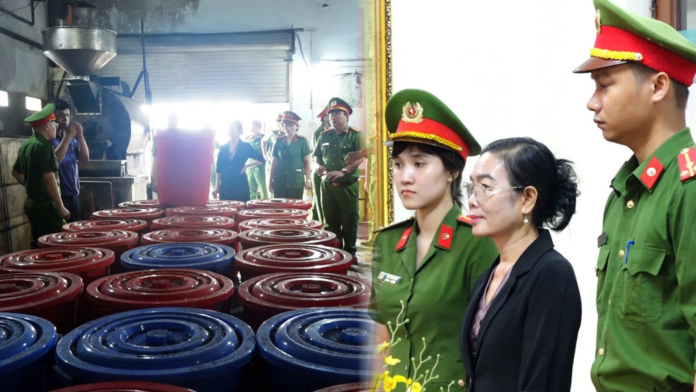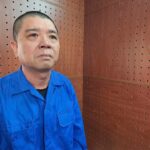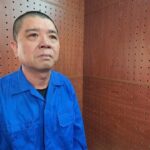On June 10th, the Police Investigation Agency of Phu Yen province announced that they are expanding their investigation into a case of large-scale production and distribution of counterfeit coffee bearing the well-known Dạ Thảo label within the province.
Four Months of Production Yielded 21 Tons of Fake Coffee
Previously, on the afternoon of June 9th, the Police Investigation Agency of Phu Yen province issued a decision to prosecute the case and the defendant and imposed a residence restriction order on Ms. Đặng Thị Hòa Hiệp, a resident of Tây Hòa district, for the crime of producing and trading counterfeit food products. Ms. Hiệp is the owner of Đại Chúng – Dạ Thảo, a private enterprise specializing in the production of Dạ Thảo-branded coffee powder for the domestic market.
According to the investigation, at the beginning of 2025, the Economic Police of Phu Yen province established a specialized team to combat the production and trading of counterfeit coffee powder in the area. On April 11th, the Economic Police of Phu Yen province, in collaboration with the Department of Agriculture and Environment, inspected the production and trading activities of the private enterprise Đại Chúng – Dạ Thảo. The authorities seized over 3.4 tons of coffee packaged in paper bags that had not yet been distributed for consumption. The results of the quality inspection revealed that the coffee contained less than 70% of the quality declared on the product packaging.
According to the initial investigation, since December 2024, Ms. Hiệp had adjusted the production formula, reducing the caffeine content in the product to increase profits. The enterprise has produced more than 21 tons of coffee powder, of which more than 17.6 tons have been consumed, generating nearly 1.3 billion VND in revenue.
Notably, Dạ Thảo coffee powder was recognized by Tây Hòa district as a 3-star OCOP product in 2023. Following the news of the investigation results indicating that this product is counterfeit, the People’s Committee of Tây Hòa district stated that they would revoke the OCOP certificate that had been granted.
Recently, the Economic Police of Đắk Lắk province prosecuted Mr. Phan Danh Dương Bảo, a resident of Khánh Hòa province, and his wife, Ms. Hồ Thụy Bích Dân, for investigating their involvement in the production and trading of counterfeit coffee powder. During an emergency search of Mr. Bảo’s coffee production facility in Khánh Hòa, the police seized 2 tons of soybeans, sugar, coloring agents, flavoring agents, and more than 1,600 bags of coffee powder with a total weight of nearly 1 ton.
Mr. Bảo confessed that he had been producing fake coffee powder since 2019 but only started doing so on a large scale in 2024. His formula consisted of mixing 3-9 kg of coffee beans with soybeans and additives for color and flavor, resulting in 100 kg of counterfeit coffee powder. From the beginning of 2024 to the present, Mr. Bảo and his wife have produced and sold more than 20 tons of fake coffee powder to the market.
Also in Đắk Lắk, the Economic Police discovered a sundry store in Buôn Ma Thuột city selling more than 100 kg of coffee powder produced by Phát Hải Production Trading Services Co., Ltd. The investigation revealed that Mr. Nguyễn Thanh Hải, Chairman of the company’s Board of Directors, used only 10% coffee beans and 90% additives, including 70% soybeans and 20% coffee husks, to produce counterfeit coffee. The caffeine content was only 0.39%-0.41%, far lower than the 1% declared on the packaging. This company has produced and sold hundreds of tons of fake coffee powder to the market.
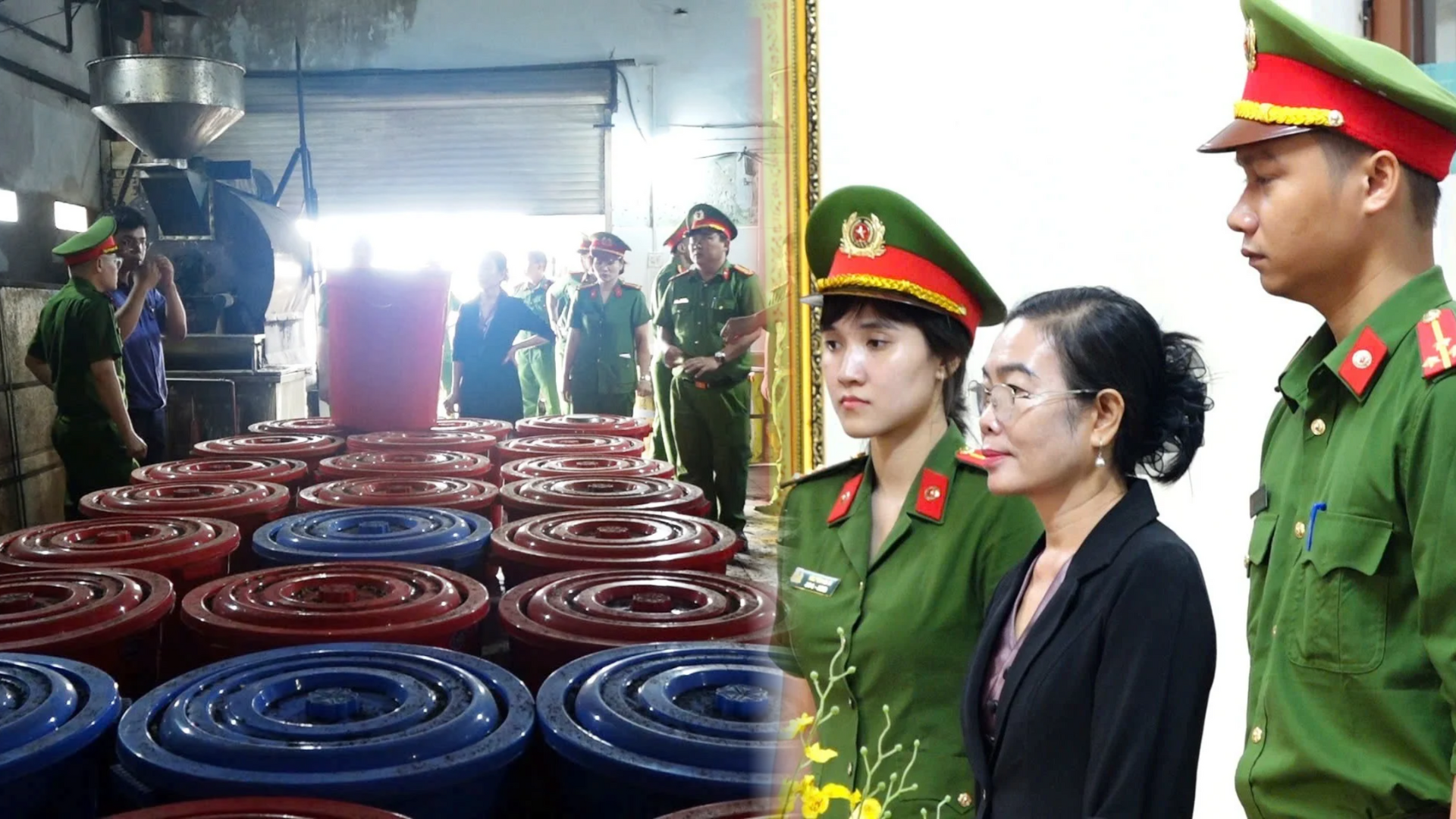
Ms. Đặng Thị Hòa Hiệp was prosecuted for producing a large quantity of counterfeit Dạ Thảo-branded coffee. (Photo provided by Phu Yen Provincial Police)
Greed Obscures Judgment
The owner of a well-known coffee brand in Tuy Hòa city, Phu Yen province, shared that the standard for coffee powder products in Vietnam requires a caffeine content of at least 1%. This is an easily achievable standard, and legitimate coffee producers can add permitted food additives such as soybean or corn starch as long as the caffeine content meets the requirement. “It is only out of greed that someone would mix 10 parts of soybeans with 3 parts of coffee, resulting in a caffeine content of less than 0.7%, which constitutes the production of counterfeit goods,” said the owner of this coffee brand.
According to Mr. Dương Phú Sơn, Head of the Industry Division of the Department of Industry and Trade of Phu Yen province, Decree 98/2020 stipulates that counterfeit goods are those that “have at least one of the basic quality or technical characteristics or the quantity of the main substance that creates the value, use, and function of the goods, reaching a level of 70% or less compared to the minimum level stipulated.” For coffee products, the main substance that creates the value is caffeine, which must be at least 1%. “There are many types of counterfeit goods, such as those that are counterfeit in terms of quality or brand. In the case of the Dạ Thảo coffee brand, which has a caffeine content of less than 0.7%, it is considered counterfeit in terms of quality,” Mr. Sơn clarified.
Mr. Lê Sỹ Kim, Head of the Food Safety Division of the Department of Health of Phu Yen province, stated that according to regulations, enterprises trading in food products must obtain a food safety certificate. To obtain this certificate, enterprises must send samples for testing, and if they meet the standards, they will be granted the certificate. Subsequently, the enterprise must self-declare the product’s quality and send the self-declaration dossier to the local Department of Health for publication on the department’s website and information management. “For coffee products, if the quality of the goods is less than 70% of the parameters declared by the enterprise, it is considered counterfeit,” said Mr. Kim.
According to a leader of the People’s Procuracy of Đắk Lắk province, through the exercise of prosecution rights and judicial control, he has observed that the situation of production and trading of counterfeit coffee powder in recent years has become increasingly complex. He explained that to produce counterfeit coffee powder, establishments will add chemicals for color, flavor, and taste. These products are then introduced to coffee shops and sundry stores at prices significantly lower than genuine coffee powder, negatively impacting legitimate coffee producers and traders and the reputation of the coffee industry.
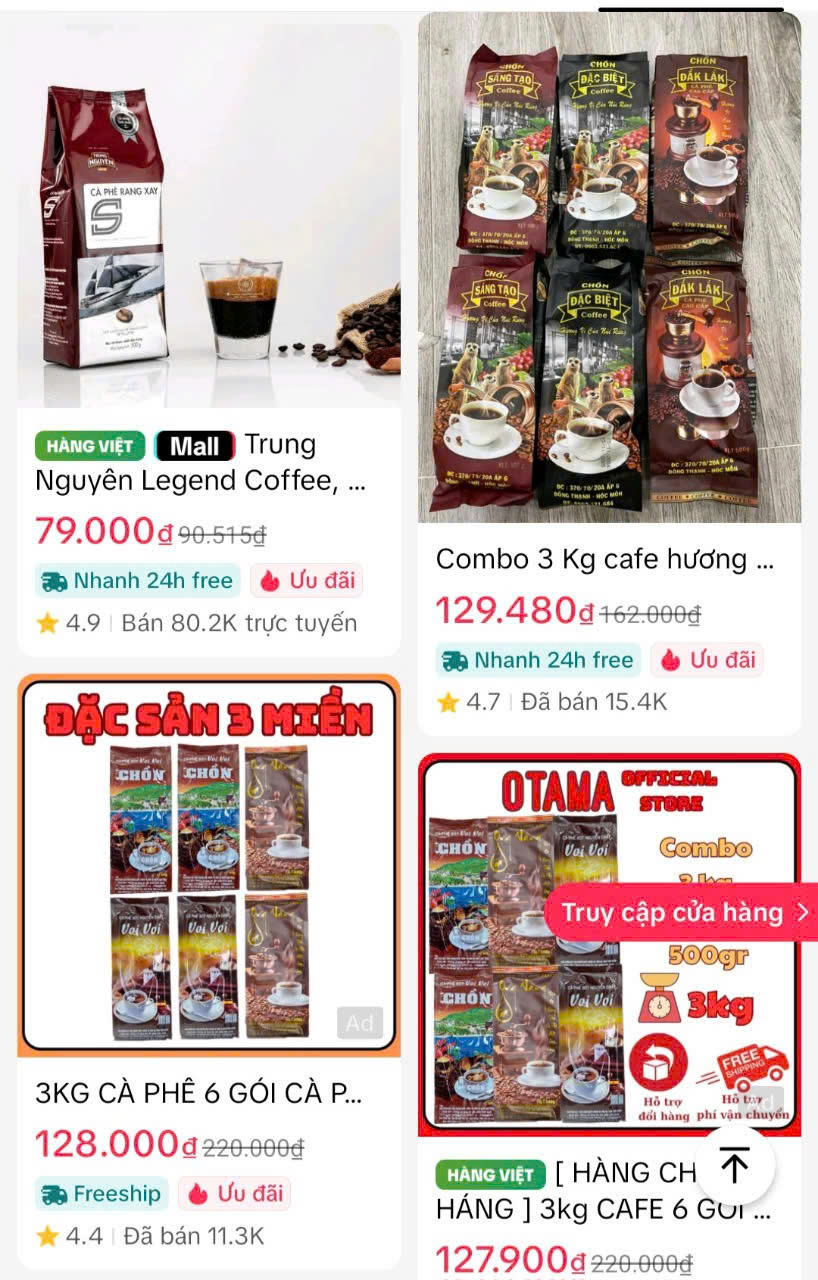
Cheap coffee products are widely sold on online marketplaces. Photo: LÊ TỈNH
The Need for Transparency in “Fake Coffee” Products
Mr. Trần Khải Minh Nhật, Vice Chairman and Head of Training of the Ho Chi Minh City Food and Beverage Association (FBA), pointed out that many coffee manufacturers add other components such as corn, soybeans, additives, and chemicals to maximize profits. According to him, the practice of adding other components to coffee originated from difficult and scarce times in the past. “Vietnam is now a leading coffee exporter in the world, so why are we still doing this? If we add other components, consumers must be informed,” Mr. Nhật asserted.
Associate Professor Dr. Nguyễn Duy Thịnh, former lecturer at the Institute of Food Technology and Food Hygiene of Hanoi University of Technology, shared that some coffee manufacturers use cereals, commonly soybeans and corn, to dilute coffee with the intention of reducing caffeine content and lowering production costs. With robusta coffee, which naturally has a caffeine content of 2.5%-3%, it is not necessary to use 100% coffee in the production of coffee powder. “If the use of soybean and corn ingredients and food additives is controlled and kept within permissible thresholds, food safety can still be ensured,” said Mr. Thịnh.
According to the reporter’s investigation, there are indeed types of coffee made from 100% coffee beans that have negligible caffeine content due to decaffeination. This type of coffee is quite popular in Japan and commands a high price. Additionally, the development of coffee alternatives is gaining momentum in many countries. For example, in Germany, roasted barley is a popular coffee substitute that offers a similar flavor without the caffeine. In France and some states in the US, roasted chicory root is used in combination with coffee or even as a complete replacement. However, these “fake coffee” products are always openly declared to consumers, who can then make an informed choice.
N.Ánh
Rampant on Online Marketplaces
While the price of raw coffee in the market has soared to unprecedented levels, the maze of cheap coffee on e-commerce platforms has left consumers bewildered.
On TikTok Shop, a store advertised a combo of 3 kg of special coffee for only VND 118,000, equivalent to about VND 39,000/kg – not even half the price of raw coffee. The description states that this is “traditional filter coffee” mixed with “supporting ingredients.” This store has recorded more than 11,000 sales of this product.
Several other stores on TikTok Shop also offer attractive promotions, such as a combo of 6 packs (total of 3 kg) of coffee for only VND 136,000, or 1.5 kg of weasel coffee for VND 165,000…
On the Lazada platform, a product introduced as premium weasel coffee is priced at only VND 45,000-60,000/kg and has recorded 20,000 purchases. Many stores on this platform provide sparse product descriptions, lacking information about the place of production, quality standards, or test results. A similar situation occurs on Shopee, where a product described as “premium delicious coffee” is priced at just over VND 50,000/kg.
L.Tỉnh
Indictment: Couple Charged with Selling Tons of Counterfeit Coffee Powder
“A devious couple devised a scheme to produce 100 kg of counterfeit coffee powder. Their recipe included a mere 3 to 9 kg of actual coffee beans, with the remainder consisting of soybeans and various additives. They roasted and ground this peculiar blend, hoping to turn a profit from their deceptive endeavor.”

